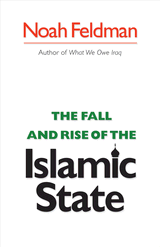
In the latest New York Review of Books, Malise Ruthven offers a cogent review of nine recent books about Islam and terrorism. Here is a brief excerpt about Noah Feldman’s The Fall and Rise of the Islamic State. Check out the online article for the full review.
Excerpt from Malise Ruthven, “The Rise of the Muslim Terrorists,” New York Review of Books, Volume 55, Number 9, May 29, 2008
Jihadis are not the only political activists seeking an Islamic state that will restore the Sharia—the holy law of Islam—to the position it held in pre-colonial times. In a short but masterful exposition, The Fall and Rise of the Islamic State, Noah Feldman seeks to answer a question that puzzles most Western observers: Why do so many Muslims demand the “restoration” of a legal system that most Occidentals associate with “medieval” punishments such as amputation for theft and stoning for sexual transgressions? What do they mean by, and expect from, an Islamic state?
Feldman’s analysis focuses on the crucial responsibility of the Ottoman state for the decline of the Sharia. Pre-modern Islamic societies were for the most part governed according to an informal division of authority between the military rulers (often outsiders such as the Mamelukes, recruited from warrior societies, which were far removed from Islam’s cultural centers) and the religiously trained class of legal scholars conversant with the law. The informal compact comparable to, but different from, the feudal arrangements in the West conferred legitimacy on the military men on condition that they upheld the authority of the scholars. The system of scholarly control over law encouraged “stability, executive restraint, and legitimacy.” Feldman writes:
Through their near monopoly on legal affairs in a state where God’s law was accepted as paramount, the scholars…built themselves into a powerful and effective check on the ruler. To see the Islamic constitution as containing the balance of powers so necessary for a functioning, sustainable legal state is to emphasize not why it failed, as all forms of government eventually must, but why it succeeded so spectacularly for as long as it did.
Under pressure from their European rivals to modernize their empire, the Ottoman sultans, beginning in the nineteenth century, began enacting a series of administrative reforms that brought legal administration under direct state control:
The single most durable feature of the reforms turned out to be the removal of effective lawmaking authority from the scholars through the substitution of written legal codes for the common law of the shari’a.
In effect, the sultans “tamed” the Sharia by encoding it in a book. The scholars were rendered impotent, their freedom to interpret the law emasculated. Their incorporation into the Ottoman bureaucracy deprived them of the real authority they had previously enjoyed as upholders and interpreters of God’s law. Originally this concentration of legal power in the hands of the sultans was balanced by a European-style constitution, including an elected assembly, which the Ottoman modernizers saw as useful engines of reform. But within a year of its first sitting in 1876 Sultan Abdul Hamid dismissed the legislature and suspended the constitution, ruling as an absolute monarch for the next thirty years.
As Feldman sees it, the absolutist state became the dominant model in most of the Sunni world in the twentieth century. The “distinctive distortions of many Muslim states in this era were products of unchecked executive authority.” However, the idea of Sharia law—of rule “in accordance with God’s law”—retained its utility; hence contemporary demands for an Islamic state that includes its “restoration.”
Unfortunately, Feldman does not flesh out his thesis with much historical detail. It would have helped his argument if he had provided specific examples of interventions by scholars in cases of disputed successions. An important example he does cite, however, is the establishment of the waqf, or Islamic trust, which, beginning in medieval times, was one of the most important institutions of the precolonial era. These foundations, which were immune from government interference, allowed the transmission of wealth down the generations while sustaining public welfare by providing hospitals, schools, mosques, inns, public drinking fountains, and other services independently of the state.
Waqfs were the primary civil soci-ety institutions in the Islamic world. As such they represented a threat to the modernizing schemes of govern-ments facing the challenge of grow-ing European power. The Ottoman sultans and other would-be reform-ers gradually took them over, incorporating them into the apparatus of state—a movement that facilitated the emergence of the autocratic regimes that prevail in much of the Islamic world to this day because the increase in the power of the state was not balanced by advances in democratic accountability.
Malise Ruthven is a professor of Islamic Studies at a number of universities, including the University of California, San Diego. Ruthven is now a full-time writer. His many books include A Fury for God: The Islamist Attack on America; Islam in the World; Islam: A Very Short Introduction and Fundamentalism: A Very Short Introduction.